Books
Books
in random order

Dreaming Water
An edifying immersion into Vicuña’s creative wellspring as well as her decolonization and ecofeminist ideals.
Beautifully designed, with a special reverence for her humanitarian heart, Dreaming Water is the most thorough monograph dedicated to the work of Chilean artist Cecilia Vicuña to date. Vicuña coined the term “Arte Precario” in the mid-1960s as a new category for her works composed of debris and structures that disappear in the landscape, and which also include her quipus (“knot” in Quechua), envisioned as poems in space.
Dreaming Water brings together over 200 works—including paintings, drawings, screenprints, collages, textiles, videos, photographs, installations, poetry, artist books and performances—created throughout the artist’s remarkable career. It also features several stimulating texts—a lengthy epistolary piece by curator and editor Miguel A. López as well as new essays by anthropologist Elizabeth A. Povinelli, curator Catherine de Zegher and art historian José de Nordenflycht. Vicuña herself contributes two texts, reflecting on her drawings from the “Palabrarmas” project and the activism of the group Artists for Democracy, which she cofounded in 1974. A rousing conversation between Vicuña, anthropologist Marisol de la Cadena and curator Camila Marambio also figures in the book, blending the artist’s voice with those who are experts in fields pertinent to her practice.
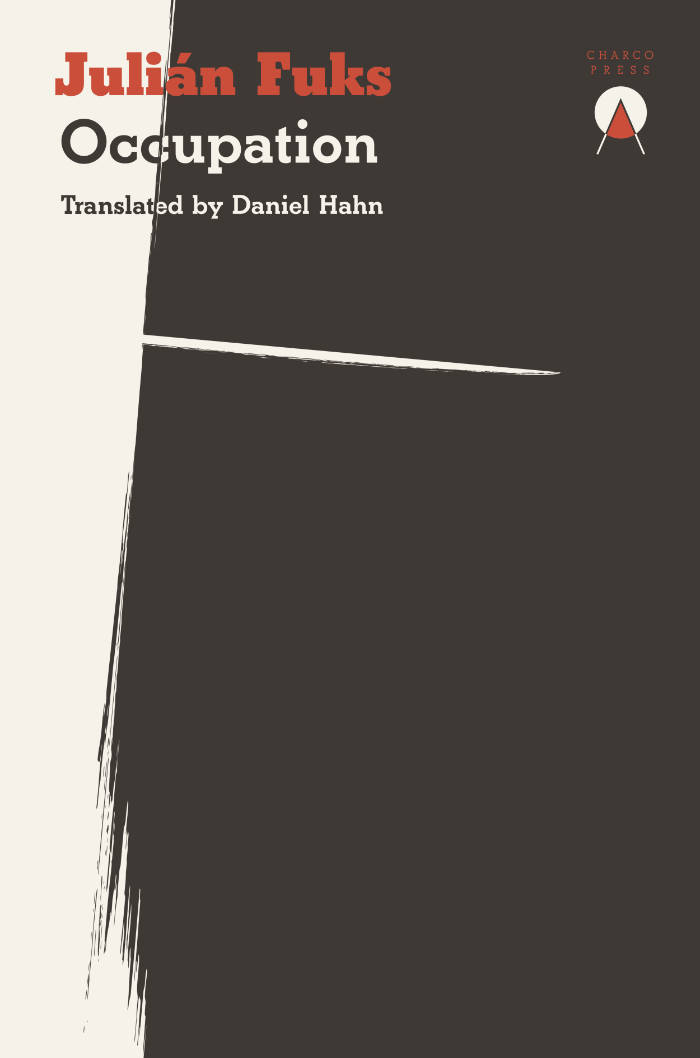
Occupation
Known and celebrated in Brazil and abroad for his novel Resistance, Julián Fuks returns to his auto-fictional alter ego Sebastián in a narrative alternating between the writer’s conversations with refugees occupying a building in downtown São Paulo, his father’s sickness, and his wife’s pregnancy. With impeccable prose, the author builds associations that go beyond the obvious, not only between glimpsing a life's beginning and end, but also between the building’s occupation and his wife's pregnancy — showcasing the various forms of occupation while exposing the frailty of life, the risk of solitude and the brutality of not belonging.

Le Dictateur #05 – FAQ
Myriam Ben Salah, Maurizio Cattelan
FAQ is an accordion-fold art publication edited by Maurizio Cattelan and Myriam Ben Salah and commissioned by Le Dictateur. Coinciding with the 10th anniversary edition of Le Dictateur, the first volume will expand into a yearly series.
FAQ stands for Frequently Asked Questions, referencing an attempt to synthesize a recurrent flow, a tenor, an ideal visual representation of a given and very subjective “now”.
Born out of an accute image eating disorder, FAQ reflects the mental assimilation of a relentless roving within physical and virtual art spaces: from galleries to tumblr accounts, museums, or artists studios; it can be seen as a portable exhibition, a show on paper, a project of restitution, a hybrid object that you can leaf and scroll through. Far from being a rational enterprise because of its lack of rules, hierarchy, order—or concept for that matter—it is expressly and brazenly as personal and biased as possible and reflects the obsessive mannerism of its authors.
Works by Korakrit Arunanondchai, Thomas Bayrle, Neil Beloufa, Judith Bernstein, David Douard, Carroll Dunham, Dan Finsel, Llyn Foulkes, Kathy Grannan, Camille Henrot, Charles Irvin, Elad Lassry, Jon Rafman, Steven Shaerer, Emily Mae Smith, Peter Sutherland, Slavs and Tatars, Andra Ursuta, Aleksandra Waliszewska, Charlie White, Jakub Julian Ziolkowski...

The Dispossessed
The Dispossessed is the spellbinding story of anarchist Shevek, the “galactically famous scientist,” who single-handedly attempts to reunite two planets cut off from each other by centuries of distrust.
Anarres, Shevek’s homeland, is a bleak moon settled by an anarchic utopian civilization, where there is no government, and everyone, at least nominally, is a revolutionary. It has long been isolated from other worlds, including its mother planet, Urras—defined by warring nations, great poverty, and immense wealth. Now Shevek, a brilliant physicist, is determined to unify the two civilizations. In the face of great hostility, outright threats, and the pain of separation from his family, he makes an unprecedented trip to Urras. Greater than any concern for his own wellbeing is the belief that the walls of hatred, distrust, and philosophic division between his planet and the rest of the civilized universe must be torn down. He will seek answers, question the unquestionable, and explore differences in customs and cultures, determined to tear down the walls of hatred that have kept them apart.
To visit Urras—to learn, to teach, to share—will require great sacrifice and risks, which Shevek willingly accepts. Almost immediately upon his arrival, he finds not the egotistical philistines he expected, but an intelligent, complex people who warmly welcome him. But soon the ambitious scientist and his gift is seen as a threat, and in the profound conflict that ensues, he must reexamine his beliefs even as he ignites the fires of change.

Natural Enemies Of Books: A Messy History Of Women In Printing And Typography
Sara Kaaman, Maryam Fanni and 1 more
Natural Enemies of Books is a response to the groundbreaking 1937 publication 'Bookmaking on the Distaff Side', which brought together contributions by women printers, illustrators, authors, typographers, and typesetters, highlighting the print industry’s inequalities and proposing a takeover of the history of the book. Edited by feminist graphic design collective MMS, the publication includes newly commissioned essays and poems, conversations with former typesetters Inger Humlesjö, Ingegärd Waaranperä, Gail Cartmail, and Megan Downey, and reprints of the original book and other publications.

We are not where we need to be, but we ain't where we were.
Tiphanie Blanc, Lili Reynaud-Dewar and 1 more
We are not where we need to be but, we ain't where we were is the first volume of a new series of publications by the collective Wages For Wages Against that reports on active research engaged within the artistic professions and institutions since 2017. Its aim is to question the underlying neoliberal logics in the contemporary art world, by orienting our object of study towards the struggles that impact it. With this publication, our hope is to put into practice various values specific to the campaign: the existence of a systematic and fair remuneration, a desire for transparency, the sharing of knowledge, and the visibilization of demands proper to the field of the visual arts and concomitant struggles. It is the result of militant experiences, at the convergence of our individual experiences and collective questionings.
With texts by Tiphanie Blanc, Antonella Corsani, Fanny Lallart, Lili Reynaud-Dewar, Ramaya Tegegne and an interview with Outrage Collectif.
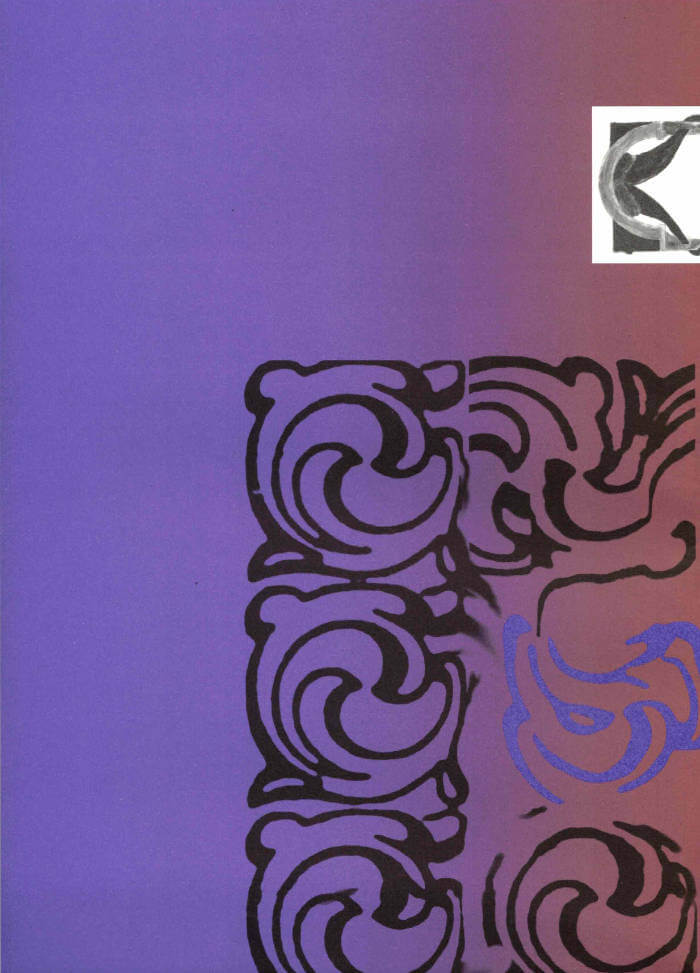
The Palace of Typographic Masonry
Ornamental Portal
The Palace of Typographic Masonry is an (imaginary) institute for the splendour and variety of visual languages. The Ornamental Portal informs the ornamental attitude of Rietlanden Women’s Office, the collective that designed this folding sheet for Von Wersin’s Kitchen. On the backside ‘The Redemptive Qualities Of Ornament’, a text by Dirk Vis, is printed. This iris printed sheet is send in a specific envelope depicting and describing the updated collection of Von Wersin's Kitchen.
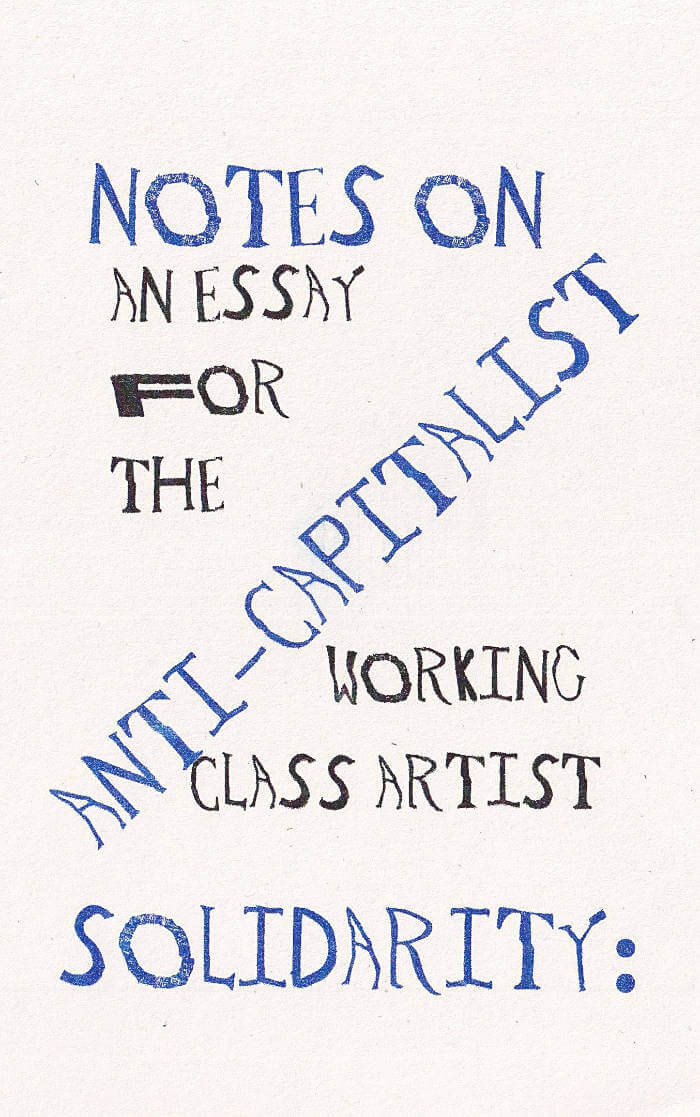
Notes on Anti-capitalist Solidarity: An Essay for the Working Class Artist
Notes on Anti-capitalist Solidarity: An Essay for the Working Class Artist was first commissioned by former Artspeak Director/Curator Bopha Chhay and published as part of their BEACON series.
In the essay, Oakley states:
Why do so many artists, designers, and low-wage workers still embrace this system of exploitation without question? Are we so compromised by the false promise of success that we have become numb to the exploitation we endure for the chance of being in a place to exploit others ourselves? Do we want to be in this position? And if not, what can we do to change this?
BEACON is a series that examines how artists’ commitment to wider social movements informs contemporary artistic practice. It will feature texts by artists whose practices engage with language and visual arts. Former Artspeak Director/Curator Bopha Chhay edited the series.

Rage Assassine: Mettre Fin au Racisme
Avant que Black Lives Matter et #MeToo ne viennent secouer l’Amérique et le monde occidental, bell hooks montrait, dans cet essai incisif, que l’abolition du racisme et l’éradication du sexisme vont de pair. Sans le féminisme, la lutte antiraciste reste une affaire d’hommes. Sans l’antiracisme, le féminisme s’expose à servir de courroie aux logiques de domination raciale. L'autrice insiste sur le bien-fondé de la rage qui anime les masses populaires et la jeunesse noire et sur la nécessité d’en faire un moteur de changement social radical. Elle propose une théorie et une pratique révolutionnaires, dont la fin est une communauté solidaire fondée sur l’égalité réelle et la volonté de tou.te.s de travailler au changement.
Traduit de l'anglais par Ségolène Guinard.
GLORIA JEAN WATKINS, connue sous son nom de plume BELL HOOKS, née en 1952, est une intellectuelle, féministe, et militante étasunienne. Elle a publié plus de trente livres et de nombreux articles, et est apparue dans plusieurs films documentaires. Traduits dans de nombreuses langues, ses ouvrages sont considérés parmi les plus importants sur la question aux Etats-Unis et suscitent un réel engouement en France depuis quelques années. Les éditions divergences ont déjà traduit et publié trois de ses ouvrages dont La volonté de changer et A propos d'amour.

Exo Revue: Si j’aurais su
Sam Bouffandeau, Chloé Delchini and 2 more
Revue du Master de Textes et de Création Littéraire de la Cambre*
Avec les textes de: Sam Bouffandeau, Chloé Clemens, Chloé Delchini, Perrine Estienne, Robin Faymonville, Gabriel René Franjou, Justine Gensse, Adèle Goardet, Bastien Hauser, Giulia Lazzara, Cyprien Muth, Sephora Shebabo.
* Le Master en Textes et Création Littéraire de l’École Nationale Supérieure des Arts Visuels de La Cambre propose un programme de formation aux étudiants qui visent à faire des métiers du texte et de la création littéraire leur avenir professionnel. Il s’adresse principalement aux jeunes écrivains et, plus généralement, à l’étudiant qui souhaite professionnaliser sa démarche artistique en lien avec la pratique de l’écrit en la confrontant à d’autres écrivains, à des éditeurs et à des professionnels reconnus de la littérature, l’informer et l’enrichir de nouveaux savoirs et de nouvelles compétences. Considérant le travail du texte et ses différentes formes comme des expressions majeures de l’homme à travers l’histoire, et les littératures des différents continents comme un art à part entière dans le champ des pratiques artistiques contemporaines, ce Master s’inscrit dans une démarche ouverte de production, de réflexion et d’instruction de l’écrit dans un monde en devenir.

Inch Aeons
Inch Aeons is a meditation on the form of meaning, the nature of nature, and the locality of tradition in an over-wired-world.
Here, award-winning poet Nuala Archer adopts, breaks and recreates the limits of haiku, evoking moments of collision and convergence, from "Beyond Conception- / Without Regeneration- / Big Bang's Leave let Be" to "Am-Is-Are-Was-Were- / Has-Have-Had-Do-Does-Did-Shall- / Should-Can-Could-Will-Would-."
Poet Juliet Patterson calls Inch Aeons "a complex and wondrous book," while poet Pam Ore says the poems are "like starlight, resonat[ing] with the brightness of an original violence, cooling-healing and coalescing into the word."
Published as part of the TrenchArt Casements series, Inch Aeons includes inside illustrations by Japanese artist Tamzo and visual art (back cover) by American artist Molly Corey.
Nuala Archer is the author of Whale on the Line, Two Women, Two Shores (with Medbh McGuckian), PAN/AMA, and From a Mobile Home. She served as the primary English-language editor for University Over the Abyss: The Story Behind 520 Lecturers & 2,430 Lectures in Kz Theresienstadt 1942-1944. In 1995 she survived a catastrophic car accident; recovering in Jerusalem, she enrolled in a theatre degree program at the School of Visual Theatre. Archer continues to perform with the Jerusalem Theatre Company at festivals around the world, including in Auschwitz, London, Dublin, New Delhi, Bangalore, Seoul and Kagoshima. She is an Associate Professor at Cleveland State University.

The Rose
Drawing on the history of “romance” as the troubadours knew it and the titular flower’s ancient allegories for sexuality and mystery, Reines plunges into feminine archetypes to explore masculine pain: “I have always liked helpless / & terrible men because they break my mind.” In these poems, inherited ideologies of gender performance are replaced with bold vulnerability: paradoxes of power and surrender transmute the speaker’s understanding of suffering, desire, and the soul.
The voice in The Rose is wry and bare, approaching the connection between erotic love and spirituality with humor. Investigating war, maternity, violent sensuality, and the role of language in magical acts, Reines is unafraid to uncover the “secret / & terrible shovelings / Of love,” and the result is a bloody and pulsing, sexy and unabashed bloom.

Time Suspended
Herman Asselberghs, Els Opsomer and 1 more
The first thing a traveller has to learn in Palestine is to wait: the Palestinians have been doing it for more than 50 years. In the refugee camps in the Gaza Strip and on the West Bank, they have been waiting for permission to return ever since the Nabka, the catastrophe of 1948, when they were driven out of their houses and away from their land.
In November 2002, the Brussels-based authors of Time Suspended went on a ten-day visit to Palestine. Like most, everything they knew of the country came from media. They discovered a complex and intricate society that could not be summed up in a soundbite. The many full-bleed images of Palestine presented here (many of them depict a somewhat deserted, laid-back, sleepy, place) challenge years of media-tainted observation and truly give insight into the daily lives of its inhabitants.

Maquillage as Meditation: Carmelo Bene and the Undead
Partly a script, partly a personal voyage into the psyche of diseducation, this book happens, has happened and will happen on the 31st of October in a place called ‘The Palace of Melancholy’. In this temporal and spatial loop, the figure of Italian actor, author, director, philosopher, and public persona Carmelo Bene is summoned to hopefully be dismissed once and for all. Bene is looked at by the author reluctantly and yet resolutely through inner voices of dissent, shame and rebellion. He is imagined in gatherings that didn’t happen and read through an epistemology of contradiction. In Giannini’s company and support, Snejanka Mihaylova, Jacopo Miliani, and Arnisa Zeqo probe the walls of the Palace, looking for an exit.

Supplication: Selected Poems of John Wieners
Supplication: Selected Poems of John Wieners gathers work by one of the most significant poets of the Black Mountain and Beat generation. Includes poems that have previously never been published, the full text of the 1958 edition of his influential The Hotel Wentley Poems, plus poems from rare sources, facsimiles, notes, and collages by Wieners. An invaluable collection for new and old fans.
John Wieners (1934-2002) was a founding member of the New American poetry that flourished in America after the Second World War. Upon graduating from Boston College in 1954, Wieners enrolled in the final class of Black Mountain College. Following Black Mountain's closure in 1956, he founded the small magazine Measure (1957-1962) and embarked on a peripatetic life, participating in poetry communities in Boston, San Francisco, New York, and Buffalo throughout the late 1950s and 1960s, before settling at 44 Joy Street in Boston in 1972. He is the author of seven collections of poetry, three one-act plays, and numerous broadsides, pamphlets, uncollected poems, and journals. Robert Creeley described Wieners as the greatest poet of emotion of their time.
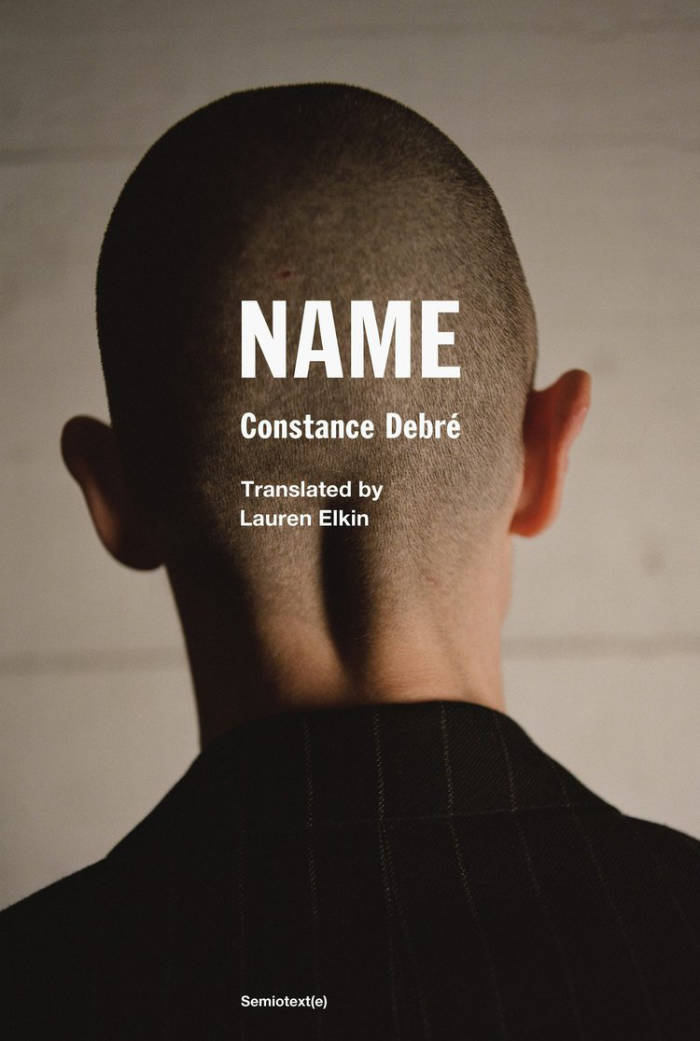
Name
Name, the third novel in Constance Debré’s acclaimed trilogy, is at once a manifesto, an ecstatic poem, and a political pamphlet. By rejecting the notion of given identity, her narrator approaches the heart of the radical emptiness that the earlier books were pursuing.
Newly single, and having recently come out as a lesbian, the narrator of Debré’s first two novels embarked on a monastic regime of exercise, sex, and writing. Using the facts of her own life as impersonal “material” for literature, Playboy and Love Me Tender epitomized what Debré (after Thomas Bernhard) has called “antiautobiography.” They introduced French and American readers to her fiercely spare prose, distilled from influences as disparate as Saint Augustine, Albert Camus, and Guillaume Dustan. “Minimalist and at times even desolate,” wrote the New York Review of Books, these works defied “the expectations of personal growth that animate much feminist literature.”
Name is Debré’s most intense novel yet. Set partly in the narrator’s childhood, it rejects Proustian notions of “regaining” the past. Instead, its narrator seeks a state of profound disownment: “We have to get rid of the idea of origins, once and for all, I’m not holding on to the corpses. … Being free has nothing to do with that clutter, with having suffered or not, being free is the void.” To achieve true freedom, she dares to enter this “void”—that is, dares to accept the pain, loss, and violence of life. Brilliant and searing, Name affirms and extends Debré’s radical project.

Sarah Lucas – Describe This Distance
A literary tribute to Sarah Lucas, at once an adroit art-historical study and a poetic travelogue.
“Distance is far, nobody said. (Somebody, surely.)” So begins Quinn Latimer's strange, elliptical account of an exhibition and a body of work by Sarah Lucas that the poet and critic has never seen, made and installed in a city she had not yet visited. In the spring of 2012 the renowned English artist's exhibition “NUDs” was mounted in Mexico City at Museo Diego Rivera Anahuacalli, the famed pyramid-like museum built by the muralist and architect Juan O'Gorman to house Rivera's approximately 50,000 Mesoamerican artifacts and objects. In the summer of 2012 Latimer found herself in Elba, the island of Napoleon's exile, where she embarked on this small, charged book. In four interconnected essays, the writer limns the myriad impressions, ideas, objects, personages, and histories relevant to Lucas's fantastically transparent yet complicated “NUDs,” and their storied making and installation in Mexico. Exploring shame, passivity, palindromes and fertility statuary, as well as notables including Antonin Artaud, Napoleon, Susan Sontag and Mary Wollstonecraft, Describe This Distance is at once an adroit art-historical study and a poetic travelogue, once or twice removed.
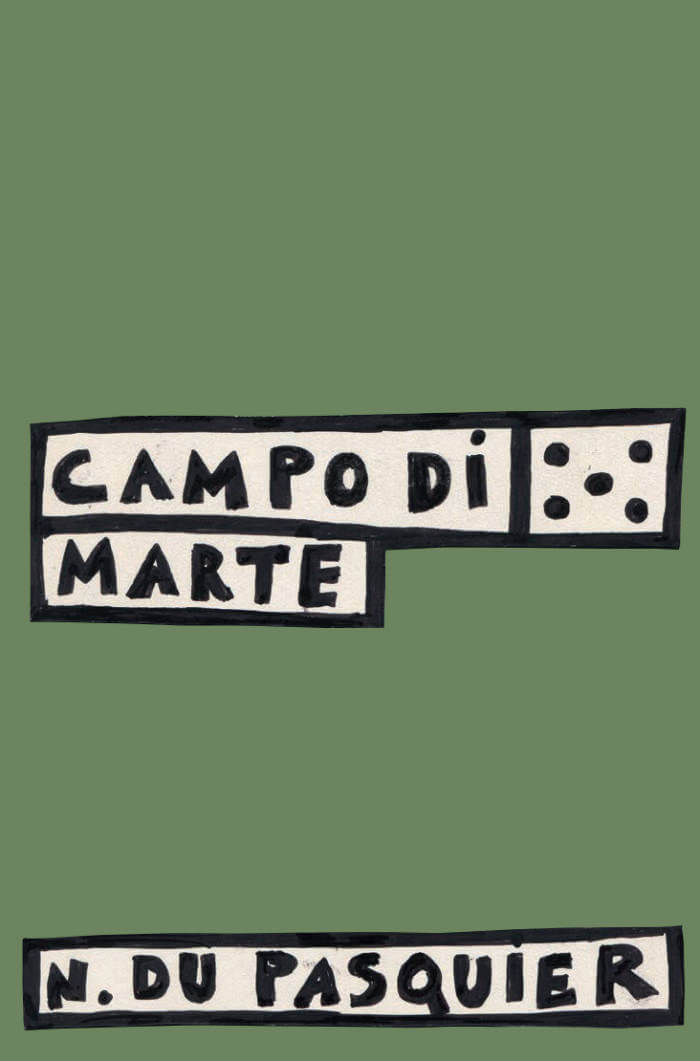
Campo di Marte
Campo di Marte was devised in March 2020, at a time when Nathalie Du Pasquier was not painting. After cutting out photos of paintings produced between the 1980s and 2020, the French artist then placed them in a sequence as if they were a series of typefaces, focusing solely on their formal qualities and the scope for interpretation offered by their assembly. What comes out is an enchanting game of nonsense, an everyday surrealism in which the images make up sentences of sorts, interwoven with various elements taken from the world of books: titles, poems or mere calculations – times when the artist was lost for words.
As Du Pasquier states: "The book was supposed to come out at the same time as the exhibition opening. That won't be the case, but it doesn't matter as they really are two separate things. This paperback is not a catalogue at all: it's something you can browse through even while sitting on the underground."

Impossible Princess
Impossible Princess is the third collection of gay short fiction by PEN Award–winning San Francisco–based author Kevin Killian. A member of the “new narrative” circle including Dennis Cooper and Kathy Acker, Killian is a master short story writer, crafting campy and edgy tales that explore the humor and darkness of desire. A former director of Small Press Traffic and a co-editor of Mirage/Periodical, Killian co-wrote Jack Spicer’s biography, Poet Be Like God, and co-edited three Spicer books, including My Vocabulary Did This To Me: Collected Poems. His latest book, Action Kylie, is a collection of poems devoted to Kylie Minogue.

Meditations
A manual of meditations on grief blocked by trauma, pliers, goats, remedies, meaning, conduits, suicide, eggs, times, tutting, God, lifts, treasury tags, wrecking yards, Douglas Barrowman, involuntary spasms, front desks, manganese deficiency, weevil shit, Mr Sheen, coal potential, the bison, The Final Cut, tone of voice, trillions of cicadas, Elisabeth Koolaart-Hoofman, bogus antler cannibalism, the Preces Gertrudianae, parodies of communication, “Cary Grant’s Wedding,” the corruption of youth, a tripod or cable, Culverwell on the Vacuola, geese, Hemans’s line on Mary Tighe, annihilation, the proletariat, plastic bags, La Compiuta Donzella di Firenze, poetry, rooms, beheadings, S106 obligations, and planks. Containing single, double, triple, and sextuple sestinas, in the old mode of retrogradatio cruciata, and other canzoni, crushed to prose.

nY49 — trans*
Sven Van den Bossche, Hans Demeyer and 1 more
“Een thematisch nummer maken over trans*esthetiek riskeert trans*heid meteen als iets aparts te signaleren, als iets wat niet simpelweg kan zijn; hoe stel je ‘gewoon’ een special issue samen?”
Het nummer werd samengesteld door Dagmar Bosma, Hans Demeyer en Sven Van den Bossche.
Met bijdrages van: Ada M. Patterson, Camille Pier, Sven Van den Bossche, Alara Adilow, Nour Helou & Afrang Nordlöf Malekian, Mariken Heitman, misha verdonck, Dagmar Bosma, Hans Demeyer, Torrey Peters, Kato Trieu, Valentijn Hoogenkamp, Romeo Roxman Gatt, Lieks Hettinga, Kalib Batta, Kopano Maroga, Hannah Chris Lomans en Nele Buyst.

Time has fallen asleep in the afternoon sunshine
Verzamelde gedichten - Against the Forgetting
For the project Time has fallen asleep in the afternoon sunshine a group of people/ performers memorize a book of their choice. Together they form a library collection consisting of living books. After years of learning by heart and reciting for readers, some of the books have now been written down from memory to create new editions, versions resulting from this process. This book is one of those books, chosen by one person, learned by heart and recited many times, and now written down again from memory. This edition is not a re-edition of the original text. It is a re-writing of the text after the process of reading, memorizing and reciting, with all the alterations that might have occured in the course of this process.
www.timehasfallenasleepintheafternoonsunshine.be

De-/Anti-/Post-colonial Feminisms in Contemporary Art and Textile Crafts
Twelve essays discussing De-/Anti-/Post-colonial Feminisms in contemporary art and textile craft. This book discusses the theoretical problems of each of these 3 approaches and each author in the book takes a different perspective on the relationships between them. These differences matter. The authors come from France, Sweden, USA (Chicano/First Nation/Black American communities), India, South Africa, The Netherlands, Pakistan, India and UK. They discuss a wide range of practices from contemporary women artists, independent teaching initiatives, experimental film and its histories, avantgarde theatre and women's craft practices in rural communities in conflict areas.
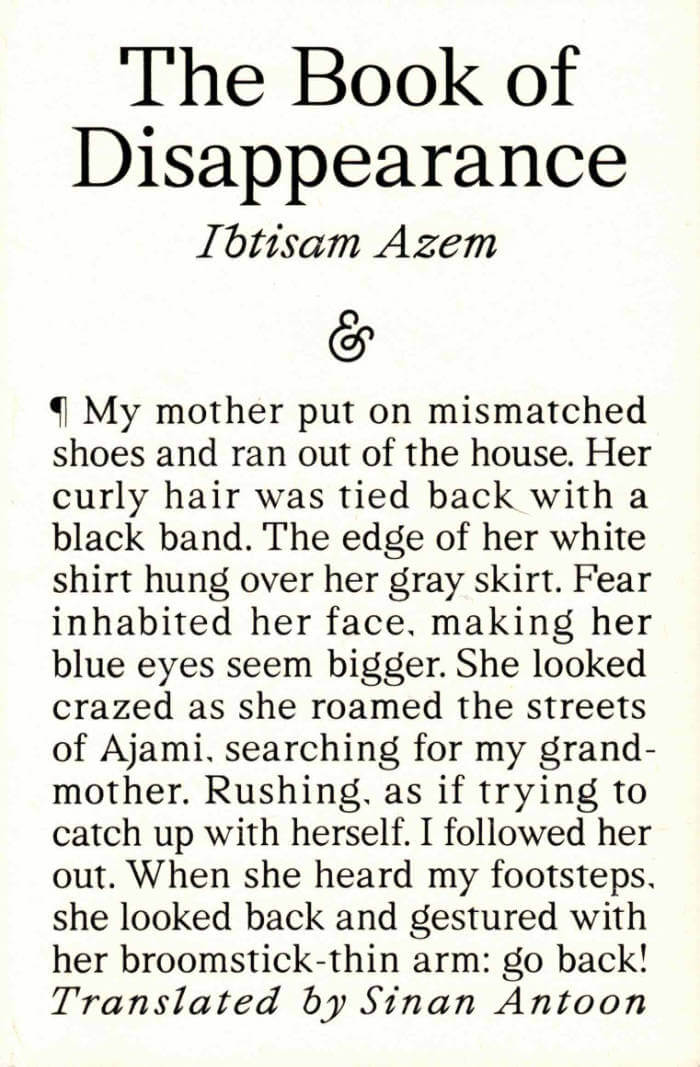
The Book of Disappearance
Alaa is haunted by his grandmother’s memories of being displaced from Jaffa and becoming a refugee in her homeland after the Nakba. Ariel, Alaa’s neighbour and friend, is a liberal Zionist, critical of the military occupation of the West Bank and Gaza yet faithful to the project of Israel. When he wakes up one morning to find that all Palestinians have suddenly vanished, Ariel begins searching for clues to the secret of their collective disappearance.
That search, and Ariel’s reactions to it, intimately reveal the fissures at the heart of the Palestinian question. Between the stories of Alaa and Ariel are the people of Jaffa and Tel Aviv – café patrons, radio commentators, flower-cutters – against whose ordinary lives these fissures and questions play out.
Critically acclaimed in Arabic, spare yet evocative, intensely intelligent in its interplay of perspectives, The Book of Disappearance is an unforgettable glimpse into contemporary Palestine as it grapples with both the memory of loss and the loss of memory.